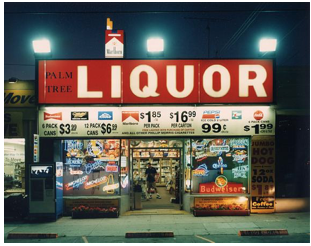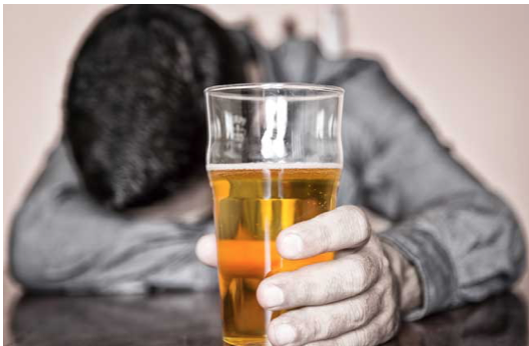CommentsVOICES--Okay, maybe it’s not so surprising that half of us drink alcohol, and the half of us that do, drink excessively.
What is surprising is that the City of Los Angeles has striped one of the few safeguards we had to manage the inevitable fallout from so many of us drinking to get drunk.
Bear with me. These are connected.
Some may ask, “What’s the big deal with people getting drunk?” and think, “heavy drinking doesn’t affect me -- unless I’m one of those with a hangover.”
That changes when we look at community impacts. Far from advocating abstinence -- I happily enjoy beer myself -- I’m seeking to point out the public impacts of mass binge drinking stemming from a lack of standards for alcohol retailers, and what can be done to keep us all safer.
While we’re concerned about violent crime, sexual assaults, and staying safe on our drive home, we may not see the connection to alcohol policy.
The problem boils down to a lack of local control over how alcohol is sold and served in LA.
While authorities are falling over themselves to license new alcohol retailers (going against state limits on density), no one is taking action to stop sales to minors or service to drunk patrons, so more people drink to excess resulting in high rates of violent crime, DUI crashes, sexual assaults, and alcohol-related hospitalizations.
Of course, alcohol is not the only widely available intoxicant bringing public health and safety challenges. The opioid crisis and rapid expansion of marijuana dispensaries make dealing with alcohol sales and service challenges all the more urgent.
Adding fuel to the fire -- while in the midst of a rapid increase in alcohol retailers -- the City of LA has recently removed one of the few protections we have to guard against poor practices by alcohol establishments.
I support alcohol businesses and want them to do well, but in my role with the Hollywood Hills West Neighborhood Council, I’ve come to understand much more deeply the widespread problems related to excessive alcohol service that consistently vex our residents and law enforcement officers.
A bartender serving a drunk patron or a clerk selling a 19-year-old a case of beer may seem like minor things in isolation, but compounded by tens of thousands across Los Angeles, these actions result in more violent crime, sexual assaults, deaths and injuries from DUI crashes, and hospitalizations—directly stemming from the excessive, unlawful alcohol service.
The preeminent national study of alcohol and drug use released earlier this month found that about half the U.S. population ages twelve and up (136.7 million) drink alcohol, and about half of those (65.3 million Americans) are binge drinkers (consuming five or more drinks within in about two hours for men or four or more for women). In other words, one in four (24.9%) Americans twelve and up are regularly drinking to get drunk, according to the National Survey on Drug Use and Health.
The highest rates of binge drinkers, four in 10 (39%), are among 18-25 year olds.
Local results are similar. The California binge drinking rates are 16.7% of the adult population according to the Center for Disease Control. According to a 2014 LA County Public Health Department report, nearly one-fifth (17.7%) of underage adults (18-20 years) and more than one-quarter (26.1%) of 21-29 year olds in LA County reported binge drinking.
So while we’re not the only city with significant rates of binge drinking, we have a huge development boom and urgent need for basic safeguards to reduce alcohol-related public burdens.
 Fortunately, there’s been growing support recently from neighborhood councils and others for a motion to the Los Angeles City Council, which represents one such critical safeguard. It would again allow local community input into how alcohol is sold and served at new bars, nightclubs, liquor stores, and other alcohol retailers, thus avoiding many problem hotspots.
Fortunately, there’s been growing support recently from neighborhood councils and others for a motion to the Los Angeles City Council, which represents one such critical safeguard. It would again allow local community input into how alcohol is sold and served at new bars, nightclubs, liquor stores, and other alcohol retailers, thus avoiding many problem hotspots.
Specifically, the motion calls for the reinstitution of “alcohol-specific conditions” on permits issued by the city, which enable community members to negotiate reasonable standards around how alcohol is sold and served, including hours of alcohol sales, types of products sold, drink specials, marketing to youth, and other practices. Utilizing local conditions is the means by which local residents and other stakeholders, including LAPD, neighborhood councils, and city council members can mitigate problems that stem from retail alcohol establishment practices.
Cities and counties throughout the state allow and routinely utilize alcohol-specific conditions on local alcohol licenses to help prevent problems.
For decades, the city allowed community members to negotiate alcohol-specific conditions with new alcohol businesses, but in recent years reversed this practice -- not only disallowing such conditions, but systematically removing them from all existing alcohol licenses with no notification to communities.
And this new practice has potentially more severe consequences here given our high concentrations of alcohol retailers.
Studies consistently show that as more and more alcohol businesses concentrate in communities, alcohol related violent crimes, injuries, and deaths increase. Period.
For example, a 2016 Los Angeles County Department of Public Health report, demonstrated a strong link between many public health and safety problems — including violent crime, emergency room admissions and hospitalizations — and alcohol retailers. According to the study, 12 of 15 Los Angeles City Council districts rank in the highest tier for their incidence of three or more different alcohol-related problems: violent crimes, vehicle crashes, deaths, emergency department visits, and hospitalizations.
As so many other cities have done, we need to get the tools to take care of these problems ourselves.
Specifically, that starts with supporting this motion to the city council.
The motion has already been endorsed by the Western Regional Alliance of Councils (WRAC) and the South LA Alliance of Neighborhood Councils (SLAANC). The next regional alliances of neighborhood councils likely to vote on the conditions motion are the Valley Alliance of Neighborhood Councils (VANC) and the Harbor Alliance of Neighborhood Councils (HANC).
So far it’s garnered endorsements from more than 15 neighborhood councils and nearly 20 public health agencies, including Children’s Hospital of Los Angeles and alcohol industry watchdog, Alcohol Justice.
Given the urgent need to proactively manage our rapidly expanding alcohol establishments, I strongly urge the Valley and Harbor alliances of neighborhood councils to join others in supporting this important motion.
Once there’s sufficient support, we expect the city council to follow through and reinstate the use of conditions for alcohol businesses.
(Oren Katz is an LA resident, father, and business chair of the Hollywood Hills West Neighborhood Council.)
-cw
















